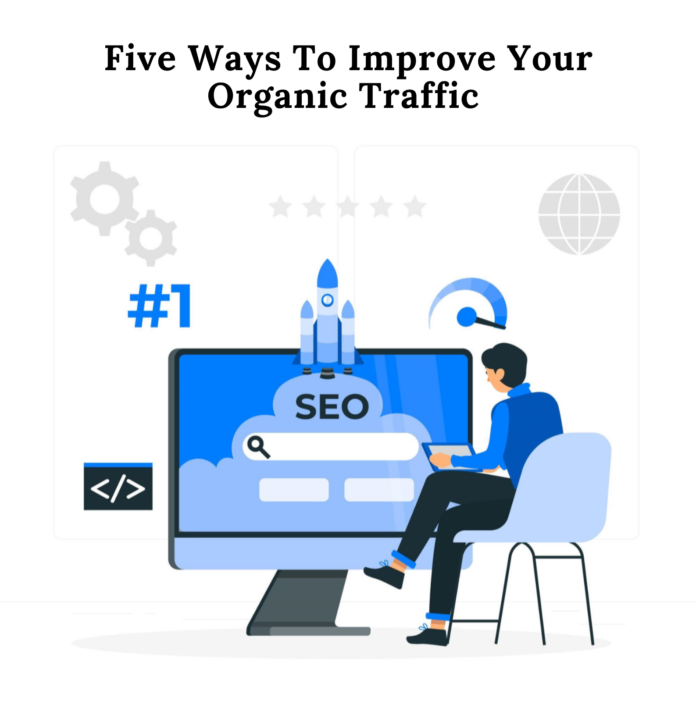The primary goal of SEO is to enhance your site’s rankings in search results. However, looking beyond that, the purpose of achieving high rankings via SEO is to attract more traffic and eventually convert that traffic into customers and leads.
Want to know how to improve your site’s rankings? Your website’s search rankings can be improved by following these five steps:
- By Publishing Relevant, Authoritative Content:
Providing high-quality and authoritative content is the best strategy to increase your search engine rankings. After all, there is no substitute for great content. This holds especially true when doing SEO marketing.
Quality content for your target audience increases site traffic, improving your site’s authority and relevance. Thus, fine-tune your web writing skills and present yourself as an authority on the topics you write about.
- By Including Keywords: Identify and target a specific keyword phrase for every authoritative content page on your website. Think of how your target audience might search for a specific page with search terms, for instance:
- Online masters in business management
- What is chemical engineering?
- Title X education resources
- Photographing the Eiffel tower
- How to apply for college scholarships?
- what is the distinction between chemical engineering and mechanical engineering?
Use Multiple Keyword Phrases
It is difficult for a webpage to achieve search engine rankings for multiple keyword phrases until and unless those phrases are similar.
The exact page may be able to rank for both “chemical engineering jobs” and “chemical engineering careers .”However, ranking “gender discrimination” and “gun violence” with a single page is unlikely.
Content
A website’s content heavily influences search engine results. Therefore, be authoritative and strategically link to relevant sources and information within your organization’s broad website and other useful websites.
- By Updating Your Content Regularly: As we feel strongly about content, search engines do as well! The best way to know if a website is still relevant is to see how often the content is updated; hence make sure to keep it fresh.
Audit your content on a schedule, semester-wise, and make updates as needed.
Blogging
Writing additional content rich in keyword phrases, especially on your departmental news blog, can boost your search engine rankings.
Blog posts can be short updates about the specific topics you are targeting. You should link your CMS pages and blog posts to each other so the reader can better understand the subject matter.
Blogging is what we are referring to here, and there are some key differences between blogging and vlogging that you must keep in mind.
- Metadata: When designing your website, every page contains a space between the <head> tags for inserting metadata; these are also known as information about the contents of your page.
You need to review and update metadata as your website changes with time.
Title Metadata
Page titles and headlines are determined by the title metadata displayed at the very top of a browser’s window in search engine results. Therefore, it is the essential metadata on your page.
Description Metadata
The textual description provided by a browser as part of a page search result is known as descriptive metadata. It’s like a window display for your website, a concise and appealing description of what is contained within to encourage people to enter.
Keyword Metadata
Keyword metadata is used rarely to tabulate search engine rankings. However, you should be already aware of your keyword phrases, so it doesn’t become problematic to add them to your keyword metadata.
You might want to include a variety of phrases. And as a general rule, try to keep it to about 3-7 phrases, with every phrase consisting of 1-4 words. An excellent instance would be a “Space science degree.”
- Have a link-worthy site with Alt-tags: A webpage rich in content, authoritative, unbiased, and helps visitors learn more about what they are interested in is most likely to attract links from other websites. This improves your search engine optimization.
Adding relevant links within the text can improve your authority and credibility. For example, instead of having generic “click here” links, try writing the name of the destination.
“Click here” has no search engine value beyond the attached URL, whereas “Sheridan Tech Enterprise Program” is rich with keywords that will improve your search engine rankings and the ranking of the page you are linking to.
Always ensure using descriptive links by linking keywords as it improves search engine optimization and is a value-addition to your readers, including those with disabilities or those using screen readers.
To make your page accessible to users who use text-only browsers or screen readers, include alternative text descriptions (alt tags) for all your photos and videos.

